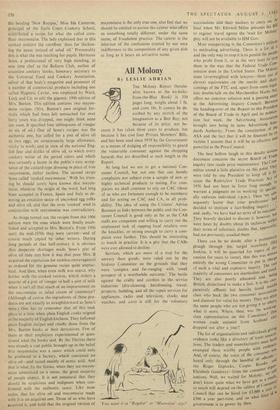All Molony
By LESLIE ADRIAN THE Molony Report (herein- after known as the no-bolts- from-the-Blue Book) is 330 pages long, weighs about 1 lb. and costs 18s. It cannot be de- scribed by any stretch of the imagination as a Best Buy; not because of its price; nor be- cause it has taken three years to produce; but because it has cost four Private Members' Bills, and has been used since 1959 by the Government as a means of dodging all responsibility to guard the vulnerable consumer against the shopping hazards that are described at such length in the Report.
At long last we are to get a national Con- sumer Council, but not one that can handle complaints nor subject even a sample of new or highly technical products to testing. For com- plaints we shall continue to rely on CAC (those of us who are fortunate enough to be members) and for testing on CAC and CA, in all prob- ability. The idea of using the Citizens' Advice Bureaux as links between the public and the Con- sumer Council is good only as far as the CAB staffs are competent and willing to carry out the unpleasant task of rapping local retailers over the knuckles, or strong enough to carry a com- plaint even further. This should be interesting to watch in practice. It is a pity that the CABs were ever allowed to decline.
Services, which are more of a trap for the unwary than goods, were ruled out by the Molony Committee on the grounds that they were 'complex and far-ranging' with 'small prospect of a worthwhile outcome.' The battle against the crafty and careless in the service industries (dry-cleaning, hairdressing, travel, property, building, arid all the repair services for appliances, radio and television, clocks and watches, and cars) is still for the voluntary
associations and their backers to carry on- At, least when Mr. Edward Milne presents his Bitt to register travel agents the 'wait for Molony ploy will not be available to HM Gov. Most exasperating is the Committee's attitude to misleading advertising. There is a lot of it and the only way to stop it is to punish the peoPle who profit from it, or at the very least to stop them in the way that the Federal Trade Com' mission does in the United States. The Molony team (overweighted with lawyers—three out of eleven) equivocates on the merits and short- comings of the FTC and, apart from some legal- istic double-talk on the Merchandise Marks Mt, offers no concrete solution and a passing sneer at the Advertising Inquiry Council. Between the handing-over of the Report to the President of the Board of Trade in April and its publiea- tion last week, the Advertising Association brought into being its tame Advertising Stan- dards Authority. From the constitution of the ASA and the fact that it will be financed by its victims I assume that it will be as effective and powerful as the Press Council.
The document concernsthe secret Board odaeraddly serious do of Trade inquiry into resale price maintenance. The Cony mittee.sound a little plaintive on this point. They were told by one President to keep off it he; cause the Restrictive Trade Practices Act of 1956 had not been in force long enough t° warrant a judgment on its working (it sPec: ally enforces individual r.p.m.). Then 'we sequently learnt that your predecessor had decided to institute a fact-finding inquiry and, sadly, 'we have had no news of its outcome', t They bravely decided to discuss it, however, but were beset by doubts about its inclusion within their terms of reference, doubts that, apparently' had not previously assailed them. There can be no doubt, after a prelimito...r: plough through this turgid manifesto (dhl`,5.. Jenkins, it will be quarried for topics of 1st cussion for years to come), that this was alms. entirely the wrong Committee to put in eharg„t of such a vital and explosive inquiry. The vast majority of consumers are inarticulate and timid. They are also poorly educated and, het 0, British, disinclined to make a fuss. It is the Ile paratively affluent but heavily taxed class who back the two consumer associati..our; and clamour for value for money. They are often the same people who are not giving it to others, what is more. Where, then, was the working class representation on this Committee? One dropped woman out ftedaeur a nioyneisatr? from Scotland w" The list of organisations and individuals giving evidence looks like a directory of trade assoe've tions. The traders and manufacturers must 1/3,. swamped these worthy people with evidelicw. And, of course, the voice of the consumer s4135 heard only through the handful of 1316.- cialasod the Roger Diplocks, Caspar Brooks Elizabeth Gundreys—from the consumer org;iii isations. Well, we waited for •Molony; we lilt, don't know quite what we have got as a r° r so much will depend on the calibre of C"%urrticr Council that can be hired for £3,000 a Yc-- • Clx rt £500 a year part-time, and on what loud government is in power by then.






























 Previous page
Previous page